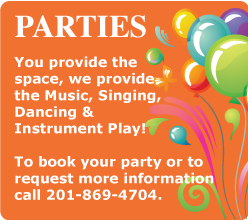Music and your baby’s development
by S. Jhoanna Robledo
Reviewed by the BabyCenter Medical Advisory Board
If someone said you could have a smarter, happier child if you play music for her while she’s still in your womb, or as young as her first month of life, you’d probably start thumbing through your CD collection. After all, every parent wants to give their child a head start in life. But can music really increase your child’s brain power? Click on the links below to find out.
Music and your unborn child
Reviewed by the BabyCenter Medical Advisory Board Last updated: September 2013
Does music affect fetal development?
No one knows for sure. Some studies indicate that fetuses can hear and react to sound by moving. But no one really knows what those movements mean because experts can’t observe an unborn baby as easily as a baby that has already been born.
Does playing music make my baby smarter?
No research supports the idea that playing music when your baby is in the womb makes her smarter. You may have heard that exposure to music makes kids of all ages smarter in math, but Gordon Shaw, a research pioneer in neuroscience at the University of California at Irvine, says these studies focused on older children, not fetuses.
For example, piano lessons may enhance children’s spatial reasoning skills (the ability to understand three-dimensional space), but researchers only tested 3- and 4-year-olds (see our article on Music and Your Toddler/Preschooler). Some experts surmise that if music has this profound effect on older kids, babies and even fetuses may benefit from it the same way.
Others say newborns can recognize music their parents played for them when they were in the womb and even perk up or fall asleep when they hear a familiar song. But Janet DiPietro, a developmental psychologist who studies fetal development at Johns Hopkins University, says these conclusions are purely anecdotal and aren’t based on true research.
Some also say that fetuses breathe in time to music they enjoy. California obstetrician Rene Van de Carr says he’s observed a 33-week-old fetus pattern his breathing to the beat of Beethoven’s Fifth Symphony. Van de Carr, who wrote While You’re Expecting…Your Own Prenatal Classroom, says because the fetus followed the rhythm of the symphony, it’s obvious he learned something about the rhythm and enjoyed it. But other researchers such as DiPietro ask, “What reason do we have to think that breathing in time to music is a good thing?”
How do I play music for my unborn child?
Your best option is to play music on the stereo as you go about your day. It’s not a good idea to use headphones on your belly since the music is up close and may overstimulate the baby. “People tend to turn up the sound because they think it needs to be loud to penetrate the abdomen,” say experts like DiPietro. “But amniotic fluid is actually a good conductor of sound.”
How loud is too loud?
The American Academy of Pediatrics reported in the late 1990s that several studies showed that unborn babies exposed to loud noise over a long period of time are more likely to be born prematurely, have lower birth weights, and suffer some higher frequency hearing loss at birth. The studies mostly involved moms who worked in high noise areas, which is of course quite different than going to an occasional rock concert.
Still, it’s not a good idea to pump up the volume on your stereo higher than 65 decibels (dB) – about as loud as background music at the store – because that may hurt or startle the baby. And if you’re listening to music for prolonged periods, it’s best to keep the volume below 50 dB (the sound level in most neonatal intensive care units).
Decibel levels of common household sounds are:
50 – 75 dB washing machine
55 – 70 dB dishwasher
60 – 85 dB vacuum cleaner
60 – 95 dB hair dryer
65 – 80 dB alarm clock
75 – 85 dB flush toilet
80 dB ringing telephone
The bottom line
Because research on this topic is in its infancy and experts can’t seem to agree on whether music is enjoyable or bothersome to fetuses, proceed cautiously. If you decide to try it, remember that moderation is key. Even Van de Carr, a proponent of fetal stimulation, agrees. “You shouldn’t go out of your way to create a musical genius,” he says. That attitude can cause you to push hard and set a standard that your child may never meet.
Play music because you enjoy it, not because you’re trying to make your unborn baby smarter. Music can help you relax, fall asleep, or perk you up if you have the pregnancy blahs. “When a woman relaxes, that’s good for the fetus and that’s an indirect effect of music on the fetus,” says DiPietro. You can put on some tunes, kick up your heels, or dance around and have fun.
If, after listening to music all throughout your pregnancy, you happen to give birth to the next Adele or Wynton Marsalis, so much the better.


